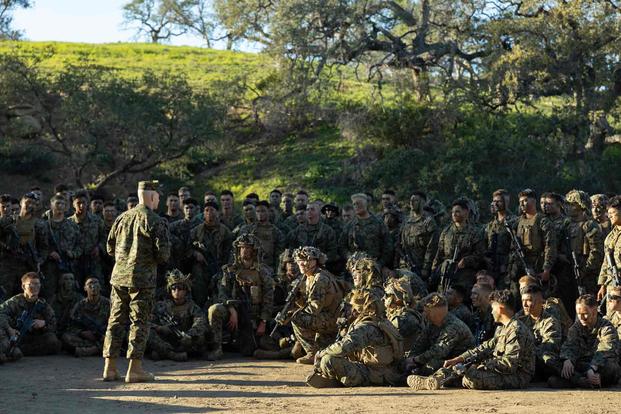A year after the Marine Corps first announced it would radically revamp how it manages Marines, the service is boasting significant wins in keeping troops from leaving the Corps and lessening the burden of serving while foreshadowing more changes to come.
When Gen. David Berger, the Corps' top leader, announced he would be modernizing the human resources system the branch has used for the last 35 years, he said the aim was to treat Marines "like human beings instead of inventory."
Now, leaders in the Corps say that, after listening to Marines, the changes and tweaks made as part of what the service calls Talent Management 2030 mean that the Corps thinks it might hit its reenlistment goals early.
Read Next: Army's New Ad Campaign Brings Back 'Be All You Can Be' as It Courts Gen Z
"This year, we're poised ... to get it done maybe next week," Maj. Gen. James Glynn, the deputy commandant who oversees manpower and reserve affairs, said Friday at a media session held at the Pentagon.
Both Glynn and a summary document the Corps released Monday point to programs like the Commandant's Retention Program, which streamlines and expedites reenlistment for top Marines, as the key to this success. Glynn said that the shift from "recruit and replace" to "recruit and retain" is taking root in the branch, which would normally expect to lose 75% of its first-tour troops every year.
Those figures stand in contrast to the Marines' recent recruitment results. Last year, the Corps, like every other branch in the military, struggled to get recruits, making its enlisted recruiting goal by just eight Marines and its reserve target exactly. Like the Navy, it managed this, in part, by dipping into its pool of delayed-entry applicants -- a move that will also make this year's targets harder to meet. The Marines have yet to discuss recruitment figures thus far this year.
Glynn, along with his boss, the Marine Corps' No. 2 officer, Gen. Eric Smith, said that flexibility from Berger to move quickly and ditch "policies that are outdated, or no longer make sense" has been key.
"Twenty years ago, our predecessors didn't build policies just to try to annoy Marines -- it's just that those policies are dated now," Smith added.
Both Smith and Glynn cited the change to allow Marines to reenlist earlier as a major achievement in the past year. Lt. Col. Eric Reid, a staffer in the Marines' manpower office, also pointed to the recent tweaks to the timing of senior enlisted promotion boards as another big win.
"It reduced the amount of time -- dramatically -- that units were without their staff [noncommissioned officers], it reduced the amount of time that families were waiting on the outcomes of boards ... and it gave families and Marines certainty," Reid said.
"I don't think we're done yet either," Glynn noted, specifically hinting at more changes to reenlistments coming down the road.
Policies like allowing Marines to stay at one location longer or taking an intermission from service are being tried out and could shape careers in the future.
The Marine Corps is also going to look at ways to bring talent into the service that breaks from the traditional approach of coming in at the bottom and working your way through the ranks.
Specifically, both Glynn and Smith cited this as a possible way to bring technical knowledge into the ranks.
"If somebody could present a compelling way to do lateral entry for software development, we would absolutely entertain that conversation," Glynn noted.
Smith acknowledged that there are concerns that "somehow somebody's going to sneak their way into the Marine Corps."
"That is false: You're going to earn the Eagle, Globe and Anchor," Smith said firmly, before adding that "in some of those more exquisite capabilities, we want them to come in and be at a level commensurate with their skill set."
On the whole, both Smith and Glynn described a Marine Corps that is trying harder to listen to its service members, be responsive to their concerns and offer them policies that would let them serve on more individualized terms.
"In the past, I think the choice has been framed as 'are you in or are you out?' ... We're trying to build a third option," Glynn explained.
"Marines are going to be required to do very, very, very hard things on the modern battlefield, and that will always be paramount," Smith said. "Where we can lessen that burden on a Marine who's willing to fight and, if necessary, give their life for the Constitution, we should lessen that burden."
-- Konstantin Toropin can be reached at konstantin.toropin@military.com. Follow him on Twitter @ktoropin.
Related: Marines Reporting 'Tremendous Success' Convincing Troops to Stay in the Service













